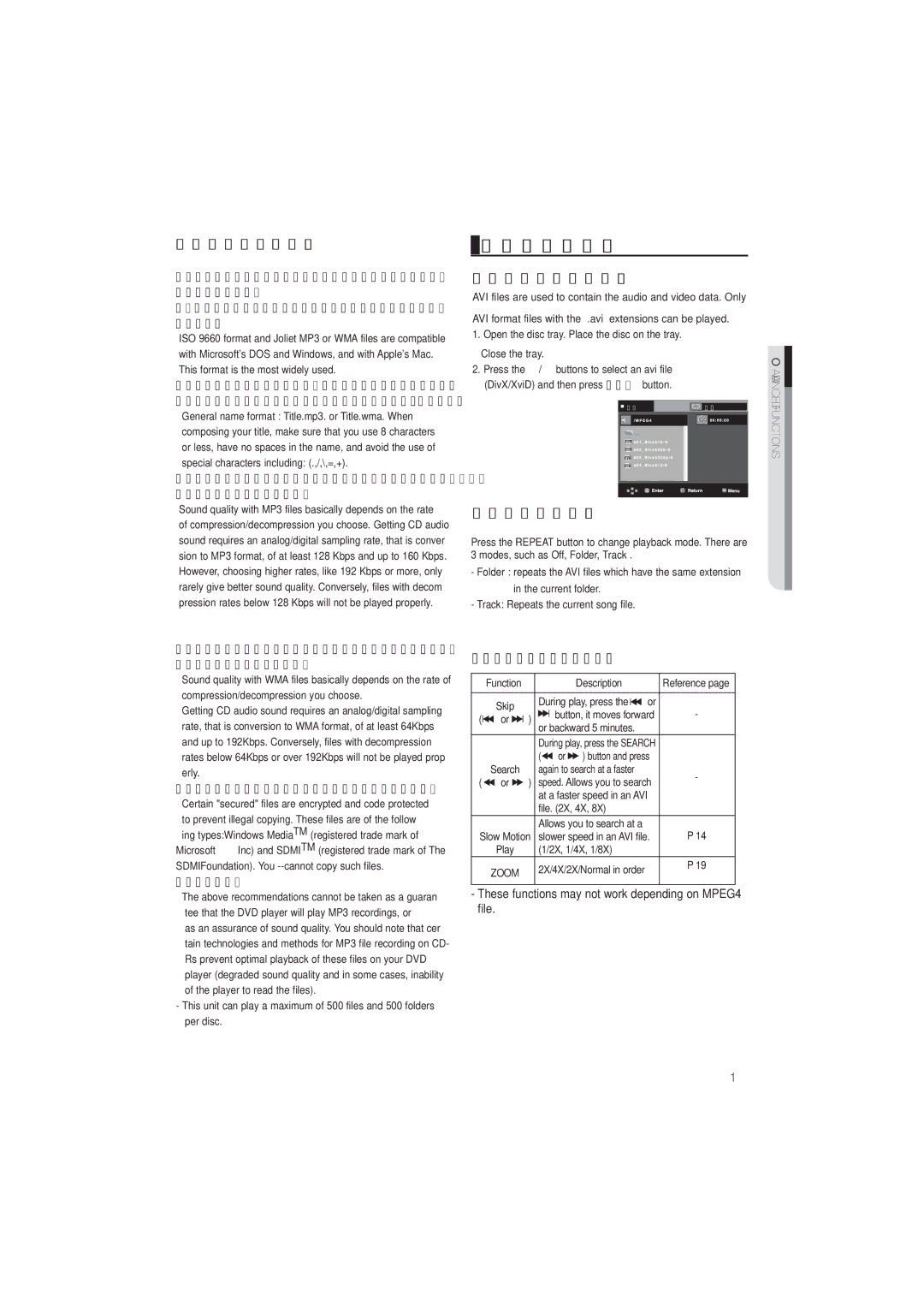
CD-R MP3/WMA file
When you record MP3 or WMA files on
- Your MP3 or WMA files should be ISO 9660 or JOLIET format.
ISO 9660 format and Joliet MP3 or WMA files are compatible with Microsoft's DOS and Windows, and with Apple's Mac. This format is the most widely used.
-When naming your MP3 or WMA files, do not exceed 8 characters, and enter “.mp3, .wma” as the file extension. General name format : Title.mp3. or Title.wma. When composing your title, make sure that you use 8 characters or less, have no spaces in the name, and avoid the use of special characters including: (.,/,\,=,+).
-Use a decompression transfer rate of at least 128 Kbps when recording MP3 files.
Sound quality with MP3 files basically depends on the rate
of compression/decompression you choose. Getting CD audio sound requires an analog/digital sampling rate, that is conver sion to MP3 format, of at least 128 Kbps and up to 160 Kbps. However, choosing higher rates, like 192 Kbps or more, only rarely give better sound quality. Conversely, files with decom pression rates below 128 Kbps will not be played properly.
-Use a decompression transfer rate of at least 64Kbps when recording WMA files.
Sound quality with WMA files basically depends on the rate of compression/decompression you choose.
Getting CD audio sound requires an analog/digital sampling rate, that is conversion to WMA format, of at least 64Kbps and up to 192Kbps. Conversely, files with decompression rates below 64Kbps or over 192Kbps will not be played prop erly.
-Do not try recording copyright protected MP3 files. Certain "secured" files are encrypted and code protected
to prevent illegal copying. These files are of the follow ing types:Windows MediaTM (registered trade mark of
Microsoft Inc) and SDMITM (registered trade mark of The SDMIFoundation). You
-Important:
The above recommendations cannot be taken as a guaran tee that the DVD player will play MP3 recordings, or
as an assurance of sound quality. You should note that cer tain technologies and methods for MP3 file recording on CD- Rs prevent optimal playback of these files on your DVD player (degraded sound quality and in some cases, inability of the player to read the files).
-This unit can play a maximum of 500 files and 500 folders per disc.
 MPEG4 Playback
MPEG4 Playback
MPEG4 Play Function
AVI files are used to contain the audio and video data. Only
AVI format files with the “.avi” extensions can be played. 1. Open the disc tray. Place the disc on the tray.
Close the tray.
2.Press the π/† buttons to select an avi file (DivX/XviD) and then press ENTER button.
| Stop |
|
| Off | |
|
|
|
|
|
|
|
|
|
|
|
|
|
|
|
|
|
|
|
|
|
|
|
|
Repeat playback
Press the REPEAT button to change playback mode. There are 3 modes, such as Off, Folder, Track .
-Folder : repeats the AVI files which have the same extension in the current folder.
-Track: Repeats the current song file.
MPEG4 Function Description
|
| Function |
|
|
|
| Description |
| Reference page | ||
|
|
|
|
|
|
|
|
|
|
| |
|
| Skip |
|
| During play, press the |
|
| or | - | ||
|
|
|
|
| |||||||
|
|
|
|
| |||||||
|
|
|
|
| button, it moves forward | ||||||
( |
| or |
| ) |
| ||||||
|
|
| |||||||||
|
| or backward 5 minutes. |
|
| |||||||
|
|
|
|
|
|
| |||||
|
|
|
|
| During play, press the SEARCH |
| |||||
|
|
|
|
| ( | or | ) button and press |
| |||
|
| Search |
|
| again to search at a faster |
| - | ||||
( |
| or | ) | speed. Allows you to search | |||||||
|
| ||||||||||
|
|
|
|
| at a faster speed in an AVI |
| |||||
|
|
|
|
| file. (2X, 4X, 8X) |
|
| ||||
|
|
|
|
| Allows you to search at a |
| P 14 | ||||
Slow Motion | slower speed in an AVI file. | ||||||||||
|
| Play |
|
| (1/2X, 1/4X, 1/8X) |
|
| ||||
|
| ZOOM |
|
| 2X/4X/2X/Normal in order |
| P 19 | ||||
|
|
|
|
|
| ||||||
|
|
|
|
|
|
|
|
|
|
| |
|
|
|
|
|
|
|
|
|
|
|
|
-These functions may not work depending on MPEG4 file.
● ADVANCED FUNCTIONS
English _21
